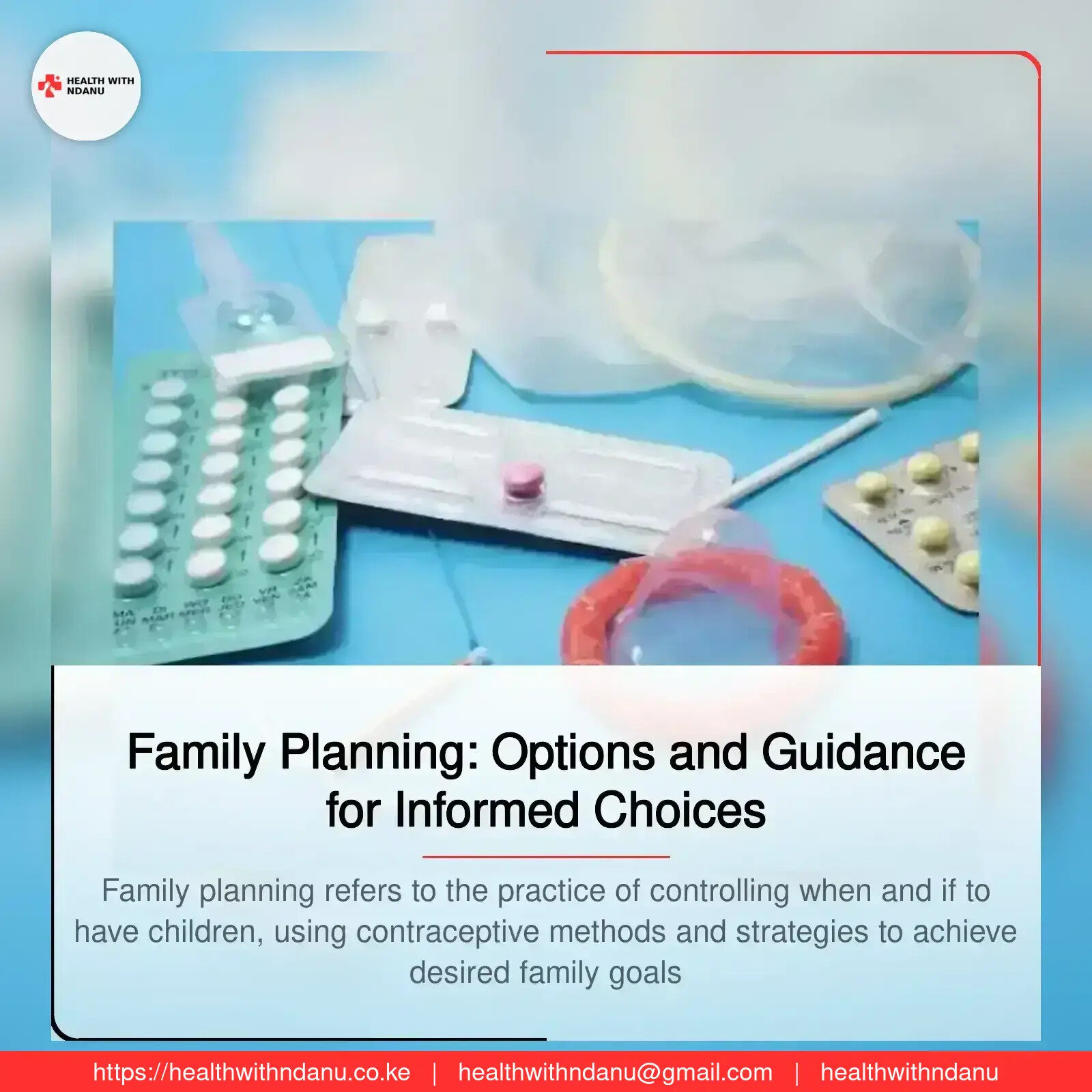Family Planning: Options and Guidance for Informed Choices



Introduction
Family planning is a vital aspect of reproductive health, offering individuals and couples the ability to decide the number of children they want, the timing of their pregnancies, and the spacing between children. By using various methods and tools, family planning empowers people to take control of their reproductive choices and improve their overall health and well-being. This article will explore family planning options, the benefits of these methods, and provide guidance for making informed decisions.
What is Family Planning?
Family planning refers to the practice of controlling when and if to have children, using contraceptive methods and strategies to achieve desired family goals. It helps individuals:
- Prevent unintended pregnancies.
- Protect against sexually transmitted infections (STIs).
- Improve maternal and child health.
- Promote economic and social stability.
Benefits of Family Planning
some of outstanding benefits include;
1. Improved Maternal Health:
Spacing pregnancies reduces health risks for mothers, including complications during childbirth.
2. Better Child Health:
Proper spacing ensures that children receive adequate care and resources, reducing the risk of malnutrition and infant mortality.
3. Empowerment of Women:
Women can pursue education, career goals, and personal growth without being burdened by unplanned pregnancies.
4. Economic Benefits:
Couples can better manage their financial resources, ensuring a stable environment for their families.
5. STI Prevention:
Certain family planning methods, such as condoms, help prevent the spread of STIs, including HIV.
Family Planning Options
There are various family planning methods available, each suited to different needs and preferences. Below are the most common options:
1. Short-Term Methods
These are reversible methods used temporarily to prevent pregnancy:
- Condoms: A barrier method that protects against both pregnancy and STIs.
- Birth Control Pills: Hormonal pills taken daily to prevent ovulation.
- Injectables: Hormonal injections, typically administered every 1–3 months, to inhibit ovulation.
- Spermicides: Chemicals that kill sperm, often used with condoms or diaphragms.
2. Long-Term Reversible Methods
These are ideal for individuals seeking extended protection:
- Intrauterine Devices (IUDs): Small devices inserted into the uterus to prevent fertilization, effective for 3–10 years.
- Implants: Rods placed under the skin that release hormones, preventing pregnancy for up to 5 years.
3. Permanent Methods
These are suitable for individuals or couples who have decided not to have more children:
- Tubal Ligation: A surgical procedure for women, commonly known as “getting your tubes tied.”
- Vasectomy: A minor surgical procedure for men to cut or seal the vas deferens, preventing sperm release.
4. Natural Family Planning (NFP)
Natural methods involve tracking fertility signs to avoid intercourse during fertile periods:
- Calendar Method: Predicting fertile days based on menstrual cycle length.
- Basal Body Temperature (BBT): Monitoring body temperature to detect ovulation.
- Cervical Mucus Method: Observing changes in cervical mucus to identify fertility.
5. Emergency Contraception
Used after unprotected sex to prevent pregnancy:
- Emergency Contraceptive Pills (ECPs): Taken within 72 hours of intercourse.
- Copper IUD: Can be inserted within 5 days of unprotected sex as emergency contraception.
Factors to Consider When Choosing a Family Planning Method
Choosing the right family planning method requires careful consideration of the following factors:
1. Health Status:
Some methods may not be suitable for individuals with certain health conditions. Consult a healthcare provider for personalized advice.
2. Effectiveness:
Methods like IUDs and implants have higher effectiveness rates compared to others like condoms.
3. Ease of Use:
Some methods, such as pills or natural tracking, require consistency and effort, while others, like IUDs, are maintenance-free after insertion.
4. Protection Against STIs:
If STI prevention is a concern, barrier methods like condoms are recommended.
5. Reversibility:
Consider whether you want a temporary or permanent solution.
6. Cost and Accessibility:
Some methods are more affordable and widely available than others.
7. Partner Involvement:
Discussing preferences with your partner can ensure mutual agreement and support.
Guidance for Effective Family Planning.
Just to mention, these are proven ways that works.
1. Seek Professional Advice:
Visit a healthcare provider to understand the pros and cons of each method and receive personalized recommendations.
2. Educate Yourself:
Learn about how each contraceptive method works, its effectiveness, and potential side effects.
3. Communicate Openly:
Discuss family planning goals with your partner to make informed, mutual decisions.
4. Adopt Safe Practices:
Always prioritize methods that protect against STIs if there is a risk of infection.
5. Regular Check-Ups:
If using hormonal or long-term methods, schedule regular medical check-ups to monitor your reproductive health.
Family Planning for Special Groups
Are you in any of special group? Read further.
1. Adolescents and Young Adults:
Access to family planning can prevent early pregnancies and enable young people to pursue education and career goals.
2. Couples with Chronic Illnesses:
Family planning helps couples with conditions like diabetes or HIV plan safe and healthy pregnancies.
3. Postpartum Women:
After childbirth, appropriate family planning methods can help ensure adequate spacing before the next pregnancy.
Common Misconceptions About Family Planning
- “Family planning causes infertility.”: Most methods are reversible and do not affect long-term fertility.
- “It’s only for women.”: Men can also actively participate through vasectomy, condom use, and supporting their partners.
- “Natural methods are unreliable.”: When used correctly, natural methods can be effective, though they require dedication and knowledge.
Conclusion
Family planning is a cornerstone of reproductive health, enabling individuals and couples to achieve their desired family goals while maintaining health and well-being. With a variety of options available, from short-term methods to permanent solutions, family planning offers flexibility to meet diverse needs. By seeking guidance from healthcare professionals and making informed decisions, individuals can enjoy the benefits of family planning and lead healthier, more fulfilling lives.
For personalized advice and access to family planning services, consult your nearest healthcare provider or reproductive health clinic.
Una uzoefu wako? Shiriki nasi
Kategoria Maarufu
Blogu Zinazotembelewa Zaidi
Daily Newsletter
Get all the top stories from Blogs to keep track.



